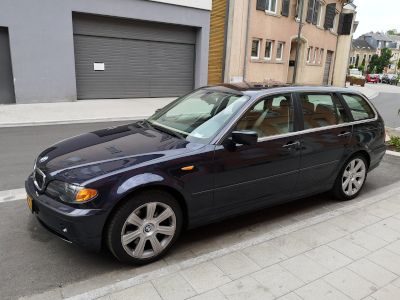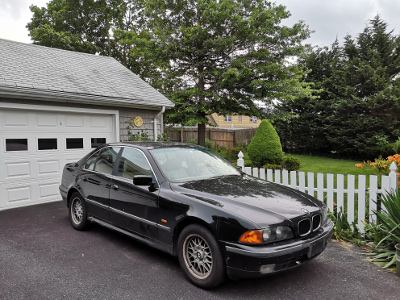
James W. Meng
Home/Resume/CV -- VLNLAB -- Projects -- Abuse by the United States Government -- Writings
A Comprehensive Discussion of Bavarian-American Hick Trucks
I've been fortunate, over the course of my relatively short life so far, to have owned a number of nice cars, now including several BMWs - a 2009 328iA Sport sedan tuned slightly beyond Euro 330i spec by Active Autowerke in Miami; a 2004 330dTA Sport wagon tuned well beyond factory spec by, well, me, in Luxembourg; and later a 1999 528iA that I basically bought from my uncle Matt (who runs The Little Garage, a BMW independent shop in Huntington, NY since 1974) in early 2020 in exchange for some gardening help after returning from political asylum in Europe and Canada.

Over the years I've done a lot of work on cars, everything from Mercedes to Jaguar to Moskvich (a Soviet Chrysler clone with a clone BMW engine) to Dodge and VW and Audi and Chevrolet and even a Nissan LEAF. I personally love Jaguars, because they're incredibly well-built, well-designed, and surprisingly fuel-efficient cars, but I refuse to buy them any longer because I'm not Anglo myself and in America that is privately a big deal because the Anglo white population in America is extremely corrupt and abusive towards the typically more clear-thinking whites of European ancestry and so I refuse to give Anglos any money for cars or parts or any of the work that goes into them. I buy BMWs instead. Among the German manufacturers, BMW is a real private business, rather than a government-funded conglomerate. Their cars are better designed, take less workshop time to do comparable maintenance work relative to other brands, and are usually more enjoyable to drive.
One of the things you notice immediately when looking for used BMWs in America, though, is that the vast majority of the stock of cars - particularly with the smaller four-cylinder or six-cylinder engines - was built with automatic transmissions. If you're a serious driver, well, some people like shifting and some people don't mind not shifting. And if you're in Europe it doesn't matter, because most cars were built with manual transmissions and the few automatics that exist have very good transmissions built by a German company called ZF - which, incidentally, have also been used by Jaguar for a very long time.
But the models bound for the USA were subject to a bit of local sourcing and cost-cutting: the vast majority of four-cylinder and six-cylinder automatic transmissions in BMWs from roughly 1988 through 2011 were provided by General Motors - specifically, the 4L30E, 5L40E, and 6L40E models. And these transmissions, in short, are shit built by demented idiots in flyover America. Why BMW was willing to pay them anything, well, I have no idea why it would have happened voluntarily but it's possible it may be something along the same lines as the way the Russians demanded that BMW's access to their vehicle market be predicated upon actually manufacturing some percentage of the car there.
Why are they shit? Well, basically, they were designed for use originally in GM's rear-drive vehicles. So we should briefly explain what those model numbers are for the transmissions. The first digit denotes the number of forward gears; the second denotes whether it's to be fitted to a longitudinally-mounted (L) or transversely-mounted (T) engine; and the double-digit number denotes its torque rating (higher=more). So what GM did, in essence, was to put the low-torque models originally intended for the Cadillac Catera and Opel Vectra in BMWs with no change whatsoever other than minor alterations for the engine mounting. Literally the only change made to the application of GM transmissions to small-engined BMWs over the nearly 25-year period of their use was the decision to remove the fluid fill pipe and declare the transmission fluid and its filter "lifetime" type. There was no other change. Not to the fluid, not to the filter, nothing.
So what was the low-torque transmission in an engineering sense? Well, it was different in two ways from the transmissions used in the Chevrolet Silverado pickup truck and the Chevrolet Tahoe SUV: it had internal gaskets that were made out of rubberized paper, rather than full-fledged rubber (they'd burst under higher torque conditions) and it had different, more viscous fluid. Fill a low-torque model with ordinary Dextron fluid like you'd do to a Silverado at regular maintenance intervals and you'll get the same hard, jerky, abrupt shifting as any ordinary Chevy.
When I got my 1999 528iA, it had over 247k miles and had lost 4th gear but was otherwise in good shape. I put the car on jack stands, drained out what fluid was left (probably half of it had escaped by that point through the long-since-destroyed rubberized paper gasket around the pan), cleaned the pan, replaced the filter and the gasket, tested the solenoids (still all original and OK at 247k) and filled it with new fluid. It lasted about a week, during which it drove just like new, and then blew another seal and wouldn't go higher than 25mph in second gear without slipping.
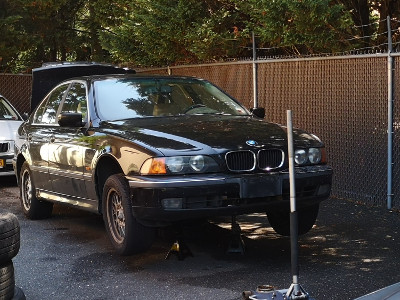
Look, all of these cars are nice to drive initially. But the transmissions all start to fail around the 150-170k mark. Some make it higher but - unless yours is in showroom condition at that age, it ain't worth fixing because a rebuild is $2000 and a replacement with a core exchange is $1600 alone in parts plus installation. If yours starts slipping or loses a gear, it's done for. Call a scrapyard and put your horrible Bavarian-American bastard hick truck out of its misery forever.
Part of the problem with these cars is that they have unencrypted telematics, and over the years, ownership basically came to mean that either your car is running perfectly or it's not running at all. This is enforced, believe it or not, by governments and backed by BMW. These cars have very sophisticated sensors and internal monitoring software, and basically, the only country I know of where one can freely drive an older, not-so-well maintained BMW is Luxembourg. Unless you're actually a criminal, their police leave you alone. It's really not a joke anymore - allegedly it became a joke over the last ten years that the US military were the 'real' owners of all of these cars. I actually became expert at getting even some of the worst examples of these cars through NY state inspections in total defiance of the NSA but simultaneously in full compliance with local laws. But at that stage they never last long - and so I simply started buying them out from individual owners who wanted the cars gone, running them into the ground, and then sending them off for scrap metal recovery. It was much cheaper than leasing a new car and cut my insurance bill down to almost nothing. I also took a certain sense of satisfaction from knowing that some of the weirdo ex-military neo-Nazi Storm Trooper types wouldn't get away with owning my cars, ever, and the fact that I could send them off to a Jewish-owned scrap metal dealer on Long Island at very favorable terms was an hilarious irony. It was like the automotive equivalent of being Brad Pitt's character in Inglorious Basterds. Or so I like to think. I also blitzed Facebook Marketplace with free advice and scrappage referrals to sellers of these BMWs. Based on what I'm aware of, I helped to take over 20 such BMWs off Long Island roads during the year I was there - no small achievement.
The lesson is that if you like BMWs, go to your local BMW center and buy one. They aren't putting crap transmissions in any longer. Everything after the E81/82/83/87/88/E90/E91/E92 (the F-series and G-series) has either a ZF manual or a ZF automatic. Even if a new BMW isn't within your price range, there are plenty of good deals to be had on Certified Pre-Owned, off-lease, loaner, and other pre-owned BMWs that dealers are willing to put their name on. With financing, you'll still probably spend less than you would on an high-mileage older car in light of the high cost of repair associated with poorly-maintained secondary-market cars. You might try (check the VIN; German-built cars have a VIN that starts with "W") to ensure you get one built in Germany, though, because some cars for the US market are built in South Africa and the USA, and while the long-term quality/reliability of those isn't yet established, the prices aren't really any different.
The Hick Trucks:
1988-1995 525iA
1996-2000 528iA, 528iTA
2001-2003 525iA, 525iTA, 530iA
1990-2000 E36 3-series
1998-2006 E46 3-series
2005-2011 E90 3-series
1996-2002 Z3
2002-2008 Z4
2004-2011 E81/82/87/88 1-series
2003-2010 E83 X3
2002-2006 E53 X5
BAVARIAN-AMERICAN HICK TRUCKS I HAVE RE-SMELTED INCLUDE:
1999 BMW 528iA WBADM6334XBY29132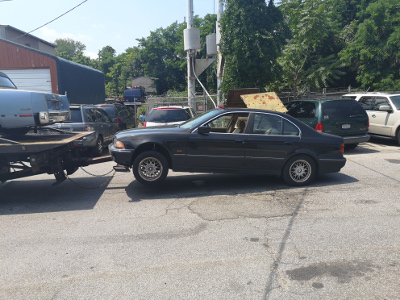
1997 BMW 528i WBADD5327VBV51101
2000 BMW 528iTA WBADP6343YBV63460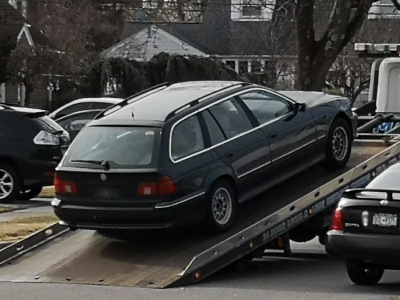
2005 BMW 330xiA WBAEW53475PN40215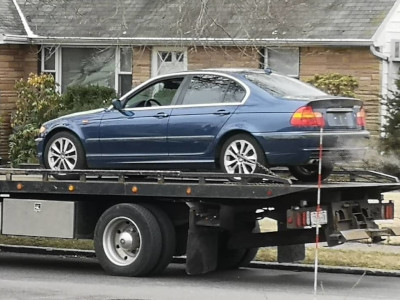
2004 BMW 330dTA WBAEX91050JW97306